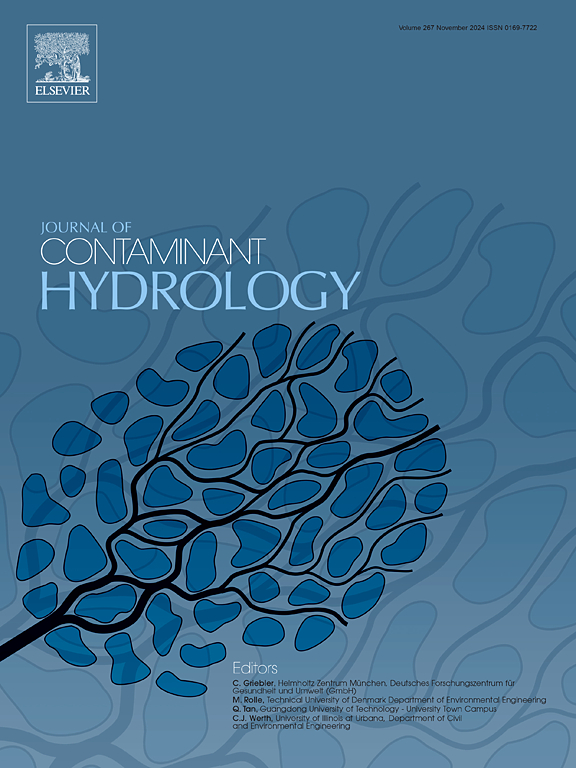Pathways and risk analysis of arsenic and heavy metal pollution in riverine water: Application of multivariate statistics and USEPA-recommended risk assessment models
IF 3.5
3区 环境科学与生态学
Q2 ENVIRONMENTAL SCIENCES
引用次数: 0
Abstract
This study analyzed surface water from the River Swat, Pakistan, using inductively coupled plasma mass spectrometry, multivariate statistical techniques, and US-EPA risk assessment models to evaluate the concentrations, distribution, pathways, and potential risks of arsenic (As) and heavy metals, including chromium (Cr), manganese (Mn), cobalt (Co), nickel (Ni), copper (Cu), zinc (Zn), cadmium (Cd), mercury (Hg), and lead (Pb). The results revealed significant correlations (p ≤ 0.01) among metals that indicated common pollution sources, likely influenced by anthropogenic point and non-point activities. Along the monitored sites (S1–S10), the mass flow of ∑metals showed a dynamic pattern: progressively increasing downstream, decreasing at S6–S7, rising again at S7–S8, and then steadily declining toward S10, with Ni being the most abundant metal, followed by Cr > As> Cu > Mn > Co > Zn > Hg > Cd > Pb. The As and Heavy Metal Pollution Index (HPI), As and Heavy Metal Evaluation Index (HEI), and Pollution Index (PI) revealed variations in pollution levels, ranking the metals in the orders of Co > As> Cr > Cd > Mn > Hg > Ni > Pb > Cu > Zn, As> Cr > Ni > Hg > Cd > Co > Mn > Cu > Zn > Pb, and Hg > Ni > As> Co > Cu > Cd > Mn > Zn > Pb, respectively. However, according to the risk assessment, overall individual metal contamination in the River Swat water was below the ecological risk threshold (ERI 〈110). Where, the Chronic Daily Intakes (CDIs), Hazard Quotients (HQs), Hazard Indices (HIs), Cancer Risks (CRs), and Total Cancer Risks (TCRs) of Cr, Mn, Co, Ni, Cu, Zn, As, Cd, Hg, and Pb associated with daily river water intake and dermal contact indicate that long-term exposure to untreated river water may pose both carcinogenic and non-carcinogenic health risks to residents.

河流中砷和重金属污染的途径和风险分析:多变量统计和usepa推荐的风险评估模型的应用。
本研究分析了巴基斯坦斯瓦特河的地表水,使用电感耦合等离子体质谱法、多元统计技术和US-EPA风险评估模型来评估砷(As)和重金属的浓度、分布、途径和潜在风险,包括铬(Cr)、锰(Mn)、钴(Co)、镍(Ni)、铜(Cu)、锌(Zn)、镉(Cd)、汞(Hg)和铅(Pb)。结果表明,各金属元素之间存在显著的相关性(p≤0.01),表明常见污染源可能受到人为点源和非点源活动的影响。沿监测点位(s1 ~ S10),∑金属的质量流表现为下游逐渐增加,在s6 ~ s7处下降,在s7 ~ s8处再次上升,然后向S10方向稳步下降,其中Ni含量最高,Cr > As> Cu > Mn > Co > Zn > Hg > Cd > Pb含量次之。和重金属污染指数(HPI),重金属评价指标(黑),和污染指数(PI)显示污染水平的变化,排名金属有限公司的订单> >铬>镉>锰> Hg >镍>铅>铜>锌、>铬>镍>汞>镉>有限公司>锰>铜>锌>铅、和Hg >镍> >有限公司>铜> Cd >锰>锌> Pb,分别。然而,根据风险评估,斯瓦特河水体中个体金属污染总体低于生态风险阈值(ERI < 110)。其中,Cr、Mn、Co、Ni、Cu、Zn、As、Cd、Hg、Pb的慢性每日摄入量(cdi)、危害商(HQs)、危害指数(HIs)、癌症风险(CRs)和总癌症风险(TCRs)与每日河流饮水量和皮肤接触的关系表明,长期暴露于未经处理的河流水可能对居民造成致癌和非致癌的健康风险。
本文章由计算机程序翻译,如有差异,请以英文原文为准。
求助全文
约1分钟内获得全文
求助全文
来源期刊

Journal of contaminant hydrology
环境科学-地球科学综合
CiteScore
6.80
自引率
2.80%
发文量
129
审稿时长
68 days
期刊介绍:
The Journal of Contaminant Hydrology is an international journal publishing scientific articles pertaining to the contamination of subsurface water resources. Emphasis is placed on investigations of the physical, chemical, and biological processes influencing the behavior and fate of organic and inorganic contaminants in the unsaturated (vadose) and saturated (groundwater) zones, as well as at groundwater-surface water interfaces. The ecological impacts of contaminants transported both from and to aquifers are of interest. Articles on contamination of surface water only, without a link to groundwater, are out of the scope. Broad latitude is allowed in identifying contaminants of interest, and include legacy and emerging pollutants, nutrients, nanoparticles, pathogenic microorganisms (e.g., bacteria, viruses, protozoa), microplastics, and various constituents associated with energy production (e.g., methane, carbon dioxide, hydrogen sulfide).
The journal''s scope embraces a wide range of topics including: experimental investigations of contaminant sorption, diffusion, transformation, volatilization and transport in the surface and subsurface; characterization of soil and aquifer properties only as they influence contaminant behavior; development and testing of mathematical models of contaminant behaviour; innovative techniques for restoration of contaminated sites; development of new tools or techniques for monitoring the extent of soil and groundwater contamination; transformation of contaminants in the hyporheic zone; effects of contaminants traversing the hyporheic zone on surface water and groundwater ecosystems; subsurface carbon sequestration and/or turnover; and migration of fluids associated with energy production into groundwater.
 求助内容:
求助内容: 应助结果提醒方式:
应助结果提醒方式:


